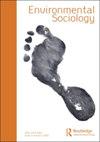A defense of waste: the case of municipal food recycling in Sweden
IF 2.8
Q3 ENVIRONMENTAL STUDIES
引用次数: 2
Abstract
ABSTRACT This article is an empirical analysis of food waste management and food recycling in Sweden. Currently, across Sweden, attempts are being made to achieve a circular economy whereby food wastes are transformed into resources. Food waste is used to produce biogas and bio fertilizer, and the enactment of food waste as a resource turns the waste into a raw material over which waste management organizations compete. Against this backdrop, the article interferes with research in ‘waste studies’ that highlight transformation of waste into something valuable, and proposes instead to ‘defend’ waste against the CE. The paper contributes to ‘waste studies’ and research on the circular economy by cautioning about the risks involved both in the establishment of a circular economy, and the treatment of waste as valuable. The empirical material used draws on a research project in which interviews were carried out with ‘waste workers’ in Swedish waste management organizations.为浪费辩护:瑞典城市食物回收的案例
摘要本文是对瑞典食品废弃物管理和食品回收利用的实证分析。目前,瑞典各地都在努力实现循环经济,将食物垃圾转化为资源。食物垃圾被用来生产沼气和生物肥料,而将食物垃圾作为一种资源,将其转化为废物管理组织竞争的原材料。在这种背景下,这篇文章干扰了“废物研究”中强调将废物转化为有价值的东西的研究,并建议对CE“保护”废物。该论文对“废物研究”和循环经济研究做出了贡献,提醒人们建立循环经济所涉及的风险,以及废物处理的价值。所使用的实证材料借鉴了一个研究项目,在该项目中,对瑞典废物管理组织的“废物工人”进行了采访。
本文章由计算机程序翻译,如有差异,请以英文原文为准。
求助全文
约1分钟内获得全文
求助全文
来源期刊

Environmental Sociology
ENVIRONMENTAL STUDIES-
CiteScore
4.60
自引率
12.00%
发文量
34
期刊介绍:
Environmental Sociology is dedicated to applying and advancing the sociological imagination in relation to a wide variety of environmental challenges, controversies and issues, at every level from the global to local, from ‘world culture’ to diverse local perspectives. As an international, peer-reviewed scholarly journal, Environmental Sociology aims to stretch the conceptual and theoretical boundaries of both environmental and mainstream sociology, to highlight the relevance of sociological research for environmental policy and management, to disseminate the results of sociological research, and to engage in productive dialogue and debate with other disciplines in the social, natural and ecological sciences. Contributions may utilize a variety of theoretical orientations including, but not restricted to: critical theory, cultural sociology, ecofeminism, ecological modernization, environmental justice, organizational sociology, political ecology, political economy, post-colonial studies, risk theory, social psychology, science and technology studies, globalization, world-systems analysis, and so on. Cross- and transdisciplinary contributions are welcome where they demonstrate a novel attempt to understand social-ecological relationships in a manner that engages with the core concerns of sociology in social relationships, institutions, practices and processes. All methodological approaches in the environmental social sciences – qualitative, quantitative, integrative, spatial, policy analysis, etc. – are welcomed. Environmental Sociology welcomes high-quality submissions from scholars around the world.
 求助内容:
求助内容: 应助结果提醒方式:
应助结果提醒方式:


